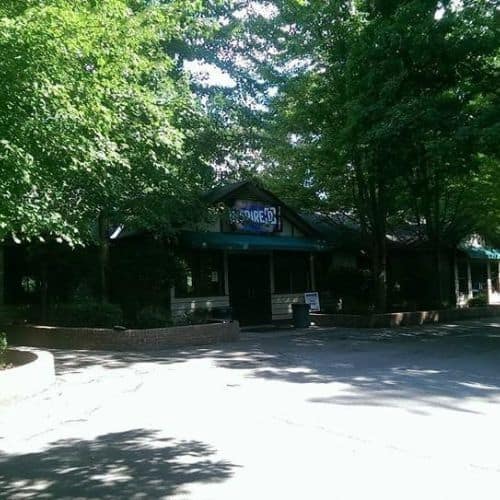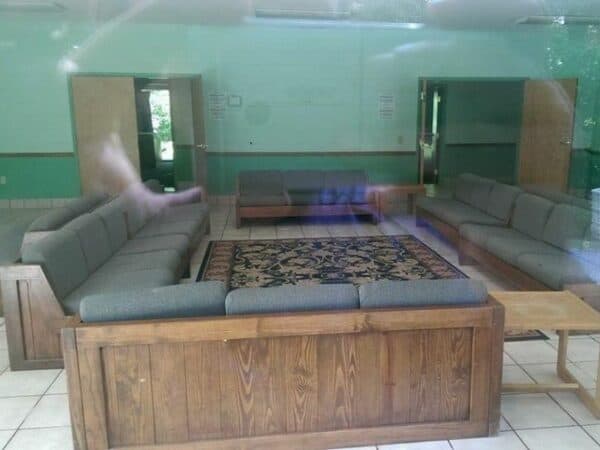Hidden Lake Academy:
Unveiling the Dark Reality of Institutional Abuse
If you’ve been watching the news cycle lately, you might have seen a flurry of stories published about Clarence Thomas. One of the more significant stories published was an investigative piece by Propublica that exposed Clarence Thomas’ sent his teenage grandson – who Thomas had custody of and was raising as a son – to a therapeutic boarding school called Hidden Lake Academy. The news stories have focused on the fact that a wealthy billionaire GOP donor paid for Thomas’ grandson’s tuition. However, most reports have not dug deeper into the “story within the story” – of what exactly Hidden Lake Academy was.
Institutions that promise to provide care, support, and education claim to play a crucial role in shaping the lives of children. However, many of these institutions fall far short of fulfilling their responsibilities, and Hidden Lake Academy is one such example. This blog post aims to shed light on the abuse that happened at Hidden Lake Academy, exposing the dark reality of institutional abuse. By raising awareness about specific instances of abuse, we hope to emphasize the need for accountability, justice, and systemic change in such establishments.
Understanding Hidden Lake Academy
Hidden Lake Academy was founded in 1998 and aimed to provide academic and therapeutic support to struggling teenagers, particularly those with emotional, behavioral, and learning difficulties. The school catered to both boys and girls aged 13 to 18. It was a founding member of National Association of Therapeutic Schools and Programs (NATSAP). However, numerous reports and testimonies have revealed the shocking truth of what transpired within its walls.
In reality, Hidden Lake Academy was a CEDU-affiliated behavior modification program for so-called “troubled teens.” Much like CEDU-programs, Hidden Lake Academy practiced harmful behavioral modification tactics such as attack therapy, force labor, large-group awareness training (LGAT), sleep deprivation, “smooshing” (forced cuddling between staff and other students), social isolation, and other harmful tactics such as those described on our Red Flags page.

Like many so-called “troubled teen” programs, Hidden Lake Academy would accept any child and promise to “fix” them regardless of the issue. It didn’t matter if the child was autistic, demonstrating normal teenage behavior, had severe mental health problems, or simply was a victim of prior trauma. Like most “troubled teen” programs, Hidden Lake Academy promised to be a one-stop shop to fix any perceived “behavioral issues” that a child was demonstrating. Once a child is enrolled into a troubled teen program, they are labeled a “troubled teen” – often without due process. Due to this label, reports of abuse are often disregarded as lies and manipulation by the “troubled teen.” These stigmas allow abuse to continue in troubled teen programs across the United States.
Focusing on Hidden Lake Academy specifically, some of the alleged abuse reported by the survivors of Hidden Lake Academy include:
- Emotional and Psychological Abuse: Former students of Hidden Lake Academy have spoken out about enduring emotional and psychological abuse. They reported being subjected to humiliation, manipulation, isolation, brainwashing, and intimidation as control methods. These tactics resulted in severe psychological trauma and lasting emotional scars.
- Physical Abuse: Multiple accounts have detailed instances of physical abuse suffered by students at Hidden Lake Academy. Reports include allegations of excessive restraint, physical punishment, and even instances of physical assault by staff members. Such acts of violence created an environment of fear and further compounded the trauma experienced by the students.
- Neglect and Deprivation: Survivors have described being deprived of basic necessities, including food, appropriate medical care, and access to education. Students were reportedly subjected to harsh and punitive disciplinary measures, often leading to their emotional and physical well-being being compromised.
- Isolation and Control: Hidden Lake Academy employed isolating tactics to exert control over students. Reports suggest that communication with the outside world, including friends and family, was severely restricted. This isolation further exacerbated the vulnerability of the students, leaving them without a support network or recourse to seek help.
Survivor Quotes
“After they removed our belongs, we were strip searched. This happened every time we left campus and came back, for example, if we were allowed to go home for the holidays. We could also be randomly strip searched. Searches consisted of any same sex staff member watching us remove our clothing, and checking over our entire bodies. They would thoroughly check our clothing and shoes, paw through our hair, and check the bottoms of our feet. I found the whole routine to be thoroughly demeaning and humiliating. Girls had to lift up their breasts and stand with legs apart. Then they made us squat and cough while turning 360 degrees. If that wasn’t bad enough, it was usually the therapeutic staff doing the searches. It wasn’t uncommon to be strip searched by your own therapist. And, even if you didn’t get searched by your primary therapist, it didn’t matter because inevitably you would end up in a therapy session with almost everyone.
“Peer groups” were a group of around a dozen kids who you would move through the program with for the next two years. All therapy was conducted within these groups. There was no one on one time with a therapist. It didn’t matter whether or not you trusted your other peer group members. There was no such thing as privacy or confidentiality. Students were made to air the most personal details of their lives before a group of teenagers they barely knew. Peer groups were formed randomly, when enough students had finally arrived to make up one group, usually around a dozen. Since everything was group based, this meant that many students waited months for their programs to even begin. I got lucky, because I was one of the last in my group to arrive.”

“Isolation was one of the worst parts about being at that therapeutic boarding school. It was a horrible eight days held captive in a place they called “Isolation Cabin,” full of physical labor and little food and army beefheads making fun of every move I made. One day we woke up in a basement on the mildewy carpet and were told to run up and down this hill till we were about to vomit. Then we could eat a cheese sandwich from the dirty pavement, pick the dirt from out my teeth, finish half an apple and then carry an icy tree up a ridge. My friend Jon started throwing up and the army rangers laughed at what a pussy he was. And it wasn’t even ten in the morning yet…
You can’t get kicked outta therapeutic boarding school even if you try. At one point I broke into the dormitory during “Lower Left Field” time. That’s when you have to be outside doing… well, doing nothing. But you can’t sit down or else there’s punishment. No more punishment, please. But I broke into the dorm anyway and took my chance so I could hide out under my bed so I didn’t have to walk aimlessly for three hours straight. Turns out they figured out I wasn’t there when they did one of their regular roll calls and I was nowhere to be found. They took me off of “General Pop” and put me on “Restrictions,” where I had to be outside all day and not shower and do intense labor, but not as intense as isolation. It went General Pop, Restrictions, Isolation, Wilderness. Wilderness was the last resort.”
“I was sent away for being an underachiever academically. I never went out, drank, drugged, or behaved erratically, I just shut down academically because I could not keep giving my parents what they wanted. I guess I rebelled in the only way I knew how. I went to classes and just stared out the window, instead of getting As like I used to. I was lost and I felt I did not belong. Being gay was not easily accepted in my sheltered, private Catholic school upbringing. I needed help understanding who I was. I was hurting. I felt less-than because of what I knew was something I could never change. But the help my parents looked to was not helpful.
My first 35 days at HLA was spent on “restrictions,” (bad kids club) because I was not opening up enough during the three hours, three times a week group attack-therapy sessions. To get out of sitting in the rain, menial manual labor, and round the clock “PT,” (physical training) I remember making up some fake issues with my parents to earn the “privilege” of again eating hot food.
During my time at HLA, I was also placed on “bans” with my first boyfriend, where we were forbidden to have any contact with each other. Even being too close to each other was a punishable offense. We were punished with manual labor and cold cheese sandwiches when we violated these bans, and I was transferred to the gay male dorm so they could try to fix the issue or just watch us more closely. Isolate the problem, I guess. All it did was create more problems. ”
“I was regularly strip searched, drug tested, belittled, humiliated by staff who, it would be later discovered were grossly unqualified to work with children with behavior troubles, or even children without. Or even, anyone. Those who stayed to work in this place must have gleaned some pleasure from our predicament. You could not ignore what was happening here. It was palpable. We, the children, had problems that were created often through no fault of our own, through dysfunctional families, and a short lifetime of adversity. I went from one environment of abuse to another. They profited greatly from those who had money and could not control themselves, much less their children. They profited greatly from our suffering.
Phone calls were monitored. If we hinted towards anything but content with our beautiful mountain views, kind counselors, and our personal transformation from bad to good, we would be harshly punished. I learned how to speak the language. I wanted to suffer as little as possible. The male staff regularly made me uncomfortable, eyeing my adolescent body, mouthing things to me, touching me, hugging me, breathing on me, aware that no one would ever believe a thing that I said. Punishments included loss of privilege to speak, loss of privilege to sleep in bed – we lay on the floor of that dorm hallway, under those fluorescent lights, blinding, oppressive. There were countless punitive abuses. We often dug ditches, free labor in the name of reform.
The hallway was covered in blood when one of my peers got her hands on a razorblade and took to her arms. A sweet release, for some, from a painful reality. A roommate cut my leg in the night while I slept. She watched me, waited until my breath slowed, shallow. I woke with a clean cut, the blood crusted in tiny drops on my thigh. I was punished for cutting myself. There I went again, lying, manipulating. Some of those children who needed inpatient mental healthcare were placed into this community, with no safety concerns. I had no voice, it was removed and shut away in the cabin we were often isolated in. Alone. Always an inner loneliness, that I would carry with me for the rest of my life. I recall crying myself to sleep, and in the morning, within seconds after opening my eyes, my body grew tense, I shook, and shook, I put my feet on the ground, my legs shivering, my whole self, denied a home. I couldn’t protect myself, and help me I begged to no one every single day. Help me.”
“The environment was not safe, nor was it nurturing. It was based on fear. Relentless screaming and grilling of the children ensued. Attempted suicides, rapes, cuttings, broken limbs, zip-tying, cold-cocking, hazing, and other egregious harms occurred that were not properly documented or reported, and were denied by the school. However, EMS records clearly indicate the incidents occurred, including “life flight” transport.”
“As time went by therapy opened up. Yet this wasn’t normal group therapy. We were forced to talk about the worst of things in our life. Yet when I opened up in letter to my family about sexual abuse it was never discussed in my therapy. My counselors didn’t have the control we thought they did. There was someone above them telling them how to operate and what to focus on. It wasn’t till years later that the abuse I endured as a child was talked about by some of my family. The school focused on my addictive personality instead during therapy. My aunt was told she was an enabler by addictions staff who was not certified to be practicing as I later found out. At this point I had drank once and smoked weed once and for that I was labeled an addict and sent to AA and NA.
I watched as things around me got worse. I saw a 90lb female get sat on by a 300 lb male staff until she went purple. Kids were cutting themselves, attempting suicide, running away and all the while I kissed ass to staff so I didnt have to endure punishment. I was rarely on restrictions maybe 7 times over 2 years which was pretty damn lucky. Most were on atleast once a month.
My relationship with my family seemed to be getting better even though they were already struggling with some of the ideals of the school. Although at 5-7 grand a month you trust what the school says. At this point the schools was already stealing money. They proposed a chapel that never got built, another pool, trips all sorts of things.
My program was the longest in school history at 27 months after my group came together. I would end up graduating high school with the equivalent of a fake degree . I saw numerous students hurt physically, mentally, emotionally during my time there. Some disappeared and we never knew what happened or found out years later. We were all being brainwashed to believe that we were safe. In reality we weren’t. Students were being sexually and mentally abused. Psychological warfare at its best being used against teens and some that were not even teens yet. We were pitted against each other.”
What happened to Hidden Lake Academy?
After over ten years of operation, a class action lawsuit was filed against Hidden Lake Academy which forced them to settle out of court and file Chapter 11 bankruptcy. This caused a significant drop in enrollment. To reform its image, Hidden Lake Academy rebranded as “Ridge Creek School” in 2009. Eventually, it closed in 2011 after a student riot that resulted in the Lumpkin County Sheriff being called to contain the scene.
Hidden Lake Academy may be closed now, but thousands of similar so-called “troubled teen” programs across the United States and abroad operate with just as much impunity as Hidden Lake Academy once did. NATSAP still thrives with over 100+ member programs within its ranks. They continue to try to appeal to parents, juvenile justice systems, foster care systems, and IEPs to send children to their programs.

What does Unsilenced do to help fight institutional child abuse?
- Justice and Accountability – By creating the Unsilenced Attorney Database and providing guidance on how to report abuse to licensing bodies, we hope to assist in survivors’ voices being heard, and those responsible are held accountable. It is essential to support the survivors in their pursuit of justice and provide them with the validation and acknowledgment they deserve.
- Preventing Future Abuse: Awareness is a powerful deterrent, preventing other individuals from falling victim to similar forms of institutional abuse. By shedding light on the dark reality of Hidden Lake Academy and similar institutions using the Unsilenced Program Archive, we can provide a public tool to drive awareness. With Project SPEAK, we educate chief stakeholders about the warning signs, encourage vigilance in identifying potential abusive practices in other institutions, and prevent children from being sent to these programs in the first place.
- Pushing for Regulation and Oversight – Raising awareness highlights the need for systemic changes. It calls for implementing strict regulations, increased transparency, and improved oversight to protect vulnerable individuals from abuse. Advocacy for survivor-centered approaches and trauma-informed care can help shape a safer future.
The Importance of Raising Awareness
While the Clarence Thomas news story highlights corruption in the highest echelons of our justice system, we need to spotlight the story within the story: Institutional child abuse.
The history of Hidden Lake Academy is a chilling reminder of the dark underbelly that can exist within seemingly reputable institutions. By raising awareness about the abuse that occurred at this facility, we highlight the urgent need for accountability, justice, and systemic change. Our collective responsibility is to ensure that survivors’ voices are heard, that the perpetrators are held accountable, and that the experiences of those who suffered at Hidden Lake Academy serve as a catalyst for the reformation of institutional practices across the board. Only through increased awareness, education, and advocacy can we create a future where individuals are protected, respected, and supported within the institutions they rely on.
For more information about Hidden Lake Academy, visit the Hidden Lake Academy Archive Page.
